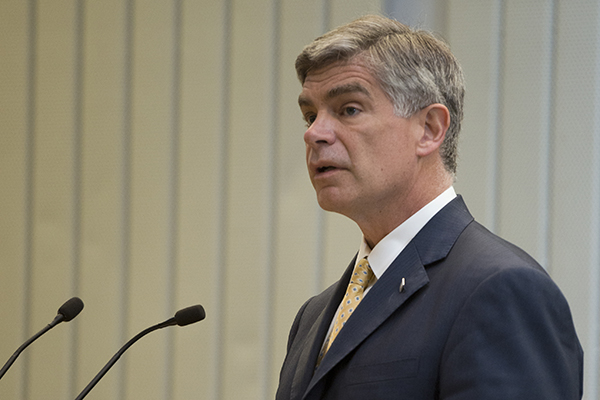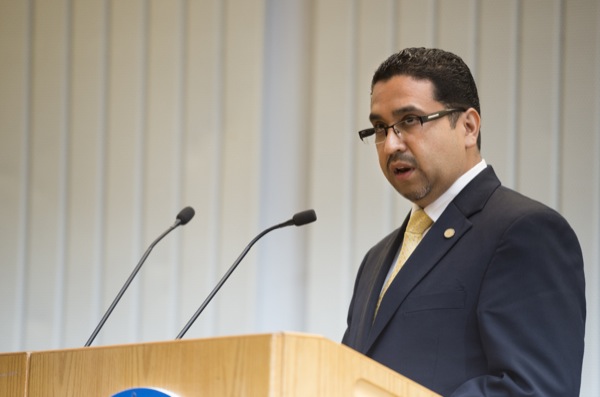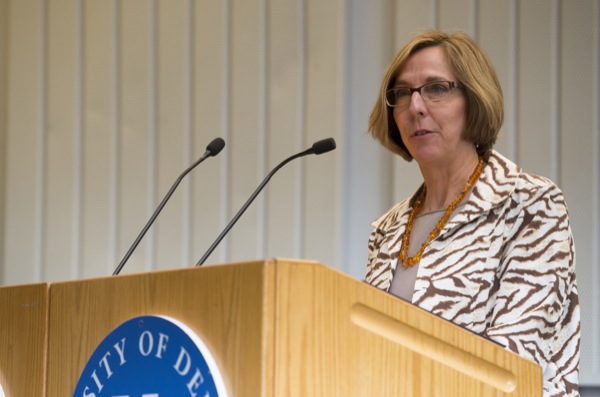


Board of Trustees
Path to Prominence, Class of 2017 preview highlight board meeting
11:47 a.m., May 9, 2013--An update on the University of Delaware’s Path to Prominence strategic plan, a review of student and faculty honors and a preview of the Class of 2017 were among the topics discussed during the UD Board of Trustees’ semiannual meeting held Tuesday, May 7, in the Trabant University Center.
University President Patrick Harker began by offering trustees an accounting of progress made toward meeting the goals of the Path to Prominence as adopted in 2008, and the challenges that lie ahead.
Campus Stories
From graduates, faculty
Doctoral hooding
Noting that UD Interim Provost Nancy Brickhouse credits the Path to Prominence with providing focal points for investments of time and money, Harker said the University has been able to stay true to its goals while weathering the most severe economic downturn in the post-World War II era.
“When the Path was coming together in 2007 and 2008, I doubt any of us could have foreseen how important having a plan would be,” Harker said. “As the recession lingered and threw some universities off course, we still had our ‘true north’ -- the commitments we’d made and that we would honor.”
Harker also discussed the progress and challenges facing UD in the key core principle areas of diversity, student learning and faculty excellence.
“There was clearly concern in 2008 that UD’s students didn’t reflect the diversity of the region,” Harker said. “They still don’t, but our strong trend toward better representation is holding.”
Equally important, Harker said, is supporting students, especially underrepresented students, once they have enrolled at UD.
“While UD has long enjoyed significantly higher retention and completion rates than four-year public universities nationwide, there remain troubling gaps between majority and underrepresented groups,” Harker said. “The graduation gap is particularly wide for African American students.”
To better retain students, Harker said that UD has formed an Enrollment Management Group to resolve challenges of meeting students’ course and sequencing needs while helping students get into required and desired classes without impeding degree progress.
“That’s harder to do now that freshman class sizes are larger and we’ve gone public with our commitment to let students explore different academic disciplines,” Harker said. “We’re improving undergraduate advising, too, because misguided or indifferent advising can be a huge stumbling block to retention and completion.”
Another strategy for enhancing student learning, Harker said, has been the establishment of interdisciplinary majors and minors, as well as problem based learning and entrepreneurial education.
“We’re building a place where students live what they learn, a place where they can discover and pursue their passions and a place where applied, authentic learning turns students into problem solvers,” Harker said. “There’s nothing more powerful than that.”
While the Path to Prominence did not create faculty excellence at UD, Harker said the plan did articulate an imperative to support and reward such excellence.
Harker also thanked donors who support endowed professorships that shore up faculty excellence, which in turn allows UD to provide high-quality program development and recruit the most competitive students while setting school records for securing research support in a time of shrinking external funding.
Class of 2017
Jose A. Aviles, director of admissions, gave the trustees an overview of initiatives and priorities in meeting a total enrollment goal of 3,800 resident and non-resident students in the Class of 2017, which will arrive on campus this fall.
“Building on a very solid foundation, the Office of Admissions has had another strong year, as evidenced with over 26,000 applications that we have received,” Aviles said. “This represents the third largest overall applicant pool in UD’s history and includes a 3 percent gain in the number of applicants with combined SAT scores of 2100 or higher.”
Also noteworthy, Aviles said, is that a record 5,000 honors applications have been received and the applicant pool was the largest and most diverse group ever, with 24 percent of the applicants describing themselves as students of color or international students.
“These 26,000 applicants were richly diverse geographically and by race and ethnicity,” Aviles said. “Students represented 46 different states, including California, Texas and Florida, and 45 countries, including China, Saudi Arabia and Brazil.”
The First State also provided another strong potential student pool, with applications from Delaware residents increasing by three percent. The applicant pool also saw an increase of seven and five percent respectively in African American and Hispanic applicants.
In processing some 26,000 applications, the Admissions staff looked at 100,000 support documents, with each application being read at least twice by a team of 20 evaluators, including the director, Aviles said.
“We evaluated the student’s academic experiences and achievements, challenges faced and qualitative factors such as essays and letters of recommendations,” Aviles said. “In those documents, we were looking for evidences of non-cognitive factors that are identified in the body of research as having a positive correlation to college retention and graduation.”
Aviles remarked that in support of its Commitment to Delawareans and its responsibility as the state’s flagship institution, UD has admitted 90 percent of Delaware residents. This fall 68 percent of state residents admitted will begin their academic journey at UD’s Newark campus.
The staff, Aviles said, has met the challenge of increasing the diversity of UD’s student profile, with 22 percent of admitted students coming from historically underrepresented subgroups complemented by a 26 percent rise in the number of international students admitted.
“I want to take this opportunity to thank all those who were involved in the process of recruiting the fall freshman class,” Aviles said. “We should all be proud of the class. I believe it is the right class for the University of Delaware.”
Provost’s report
Interim Provost Nancy Brickhouse recognized outstanding student and faculty achievements.
“It’s always an honor to share news of faculty and student excellence,” Brickhouse said. “As always, today’s presentation is in no way a complete list of all the accolades our faculty and students have amassed, but it is certainly a wonderful representation of what makes us a talent magnet.”
Board actions
At the meeting the trustees approved several resolutions:
- Dining rates were increased by an average of 3.5 percent and residence hall rates by an average of 4.5 percent, effective with the fall semester;
- A new graduate student recreation fee will be charged, including $50 and $25 fees respectively for full-and part-time students;
- No increases are scheduled this fall for the student comprehensive fee, Student Health Service fee and the University Student Centers fee.
- A Proposal for a Tobacco-Free Campus, as presented to the Trustee Committee on Student Life and Athletics, was endorsed, with special recognition of the comprehensive efforts undertaken to provide the opportunity for input from all constituents of the UD community; and
- The president was authorized to confer degrees at Commencement on May 25.
The trustees also approved the naming of the two new East Campus residence halls in honor of Louis L. Redding, the first African American admitted to the Delaware Bar who played an important role in the legal case that led to the desegregation of the Univeristy, and Eliphalet Wheeler Gilbert, the first and third president of the University.
Special trustee resolutions honored Nancy Brickhouse, for her "commitment to excellence, transparency and teamwork" as interim provost, and Mark Stalnecker, who is retiring as chief investment officer, "strong leadership in the day-to-day management of the University's investments and endowment portfolio."
In addition, the trustees reelected its officers for another term.
Article by Jerry Rhodes
Photos by Kathy F. Atkinson










